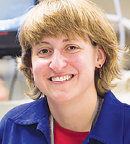The Applied Proteogenomics Organizational Learning and Outcomes (APOLLO) network, which represents a partnership among the National Cancer Institute (NCI), the Department of Defense, and the Department of Veterans Affairs, has tapped the Paulovich Laboratory at Fred Hutchinson Cancer Research Center to create a panel of tests to measure key proteins that can serve as tumor markers. The effort could ultimately lead to treatments that are more specifically targeted to a patient’s distinct type of cancer.
The APOLLO network is part of the Cancer Moonshot launched this past year, led by former Vice President Joseph Biden. The network is contributing to the initiative’s goal of making 10 years of progress in cancer research in just 5 years by using methods in proteogenomics to identify new ways to find and treat cancer. The emerging field of proteogenomics examines how a patient’s genes and the proteins the genes produce contribute to cancer growth and response to cancer treatments.

Being the physician in the room ordering toxic chemotherapies for my patients and not knowing whether they would do more harm than good…was a daily ethical dilemma.— Amanda Paulovich, MD, PhD
Tweet this quote
“There’s a growing appreciation of the value of proteomic approaches to studying cancer and how they are complementary to genomic approaches,” said Amanda Paulovich, MD, PhD, who is a member of the Fred Hutchinson Cancer Research Center’s Clinical Research Division and Professor in the Department of Medicine/Division of Oncology at the University of Washington School of Medicine. “Genomic profiles alone, while advancing our ability to predict cancer responses to therapy, cannot in many cases provide sufficient information to definitively determine which types of cancers respond best to which therapeutics,” she said. Since most cancer drugs target proteins, the hope is that adding protein analysis to gene analysis will improve the ability to predict tumor response to treatment and eventually to match the right tumor with the right drug, added Dr. Paulovich.
“With APOLLO, we believe that by merging our grasp of the genome with a better understanding of its connection to the proteome, scientists will have the knowledge—including new regimens and better tools—to assemble the puzzle of precision-based medicine and its translation toward patient care,” said Henry Rodriguez, PhD, MBA, Director, NCI Office of Cancer Clinical Proteomics Research.
Dr. Paulovich’s laboratory is part of the NCI’s Clinical Proteomic Tumor Analysis Consortium (CPTAC), which was established in 2007 to bring together leading centers nationwide in a comprehensive and coordinated effort to accelerate the understanding of the molecular basis of cancer through the application of large-scale proteome and genome analysis.
Laboratory’s Work on Assays
Dr. Paulovich’s team has pioneered targeted, reproducible proteomic assays, which offer significant advantages over traditional laboratory methods for measuring proteins. Established by work spanning over a decade of preclinical testing in the laboratory of Dr. Paulovich and her colleagues, these advantages include standardization across laboratories and the ability to reliably measure many proteins at a time in a sample.

We believe that by merging our grasp of the genome with a better understanding of its connection to the proteome, scientists will have the knowledge to assemble the puzzle of precision-based medicine and its translation toward patient care.— Henry Rodriguez, PhD, MBA
Tweet this quote
“We’re excited to take this technology that we’ve extensively vetted in preclinical experiments and now begin to implement it in clinical trials,” Dr. Paulovich revealed.
Since she joined the research center in 2003, Dr. Paulovich has been developing assays to measure proteins expressed in human tumors. She and her team have created 249 tests so far, and they have more than 100 additional tests in its pipeline. Her proteomics assays are built on a technology called multiple reaction monitoring mass spectrometry, which is widely used in clinical chemistry for quantifying metabolites.
For protein analysis, the method involves extracting proteins from blood and tissue samples, breaking them up into peptides, and using specially designed antibodies to extract the peptides of interest for quantification. Then, a mass spectrometer is programmed to select specific peptides, break them up further, and analyze the mass and electrical signals produced by the peptide fragments. Using these signals, the multiple reaction monitoring–based assays can detect not only whether a specific protein is present in a blood or tissue sample, but how much of it there is—information that could be vitally important to understanding the biology of a tumor.
Future Research Plans
APOLLO is initially focusing on patients with lung cancer, with plans eventually to include other forms of cancer. Researchers and clinicians will work side by side to classify tumors based on molecular changes in genes and in the levels of proteins, ultimately hoping to use that information to devise tests to recommend targeted therapies or refer patients to appropriate clinical trials.
Dr. Paulovich’s lab will develop a customized panel of multiple reaction monitoring–based assays and deploy these assays to quantify tumor proteins in clinical samples from patients receiving treatment. Other collaborators in the Moonshot project will decide on treatments; track how well the treatments shrink the tumors; and then search for correlations that show whether the tumors’ protein makeup related to how well the patients responded to treatment.
Dr. Paulovich, an oncologist who saw patients before turning to a research career, hopes the work will help to identify new targets for cancer therapeutics and match patients with therapeutics that are best suited to their conditions. “Being the physician in the room ordering toxic chemotherapies for my patients and not knowing whether they would do more harm than good…was a daily ethical dilemma,” she admitted. “I thought I could make a bigger impact by developing translational methods,” Dr. Paulovich concluded. ■

